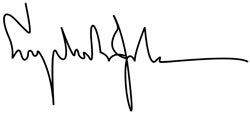By the President of the United States of America
A Proclamation
The twentieth century is rightly regarded as the era of science and technology. Scientific achievements and technological advances have radically altered the conditions of life for most men on our planet. Relations between men, and between man and his environment, have been permanently changed by events that began in the scientific laboratory.
As a result of this revolution in knowledge, it has become possible for all men to be adequately fed, clothed, and sheltered; for new energy resources to be committed to man's use; for information to be spread broadly and instantaneously to the remotest regions of the earth.
It has also become possible for man to destroy himself; for local aggression to be converted into global catastrophe; for misinformation and demagoguery to reach millions, and to shape their political destinies.
The scientific and technological revolution offers man unparalleled opportunities to liberate—or to enslave—his spirit. He can gain his freedom from physical want, and lose his identity in the prosperous streets of great cities. He can move his family to a healthier and more spacious environment, and lose the sense of community with his fellow men. He can free more hours for leisure activity, and find those hours empty and purposeless.
Thus his spirit lives in a state of crisis. In the midst of that crisis—as in days long ago, before "science and technology" were common words to his tongue—man cries out for meaning, for guidance, for assurance that his spirit is of value. In the midst of baffling change, he longs for enduring values. In the impersonal rush of his days, he seeks a sign that he is known, and accepted, as a unique person.
In this era of science and technology, we have set aside a day of prayer. Let us use it to thank God for the blessings of human industry and ingenuity, and to seek His strength, His love, and His guidance in the crisis of our spirit.
The Congress, by joint resolution of April 17, 1952, provided that the President "shall set aside and proclaim a suitable day each year, other than a Sunday, as a National Day of Prayer, on which the people of the United States may turn to God in prayer and meditation at churches, in groups, and as individuals."
Now, Therefore, I, Lyndon B. Johnson, President of the United States of America, do hereby set aside Wednesday, October 16, 1968, as National Day of Prayer, 1968.
In Witness Whereof, I have hereunto set my hand this tenth day of October, in the year of our Lord nineteen hundred and sixty-eight, and of the Independence of the United States of America the one hundred and ninety-third.

LYNDON B. JOHNSON
Lyndon B. Johnson, Proclamation 3877—National Day of Prayer, 1968 Online by Gerhard Peters and John T. Woolley, The American Presidency Project https://www.presidency.ucsb.edu/node/306631

